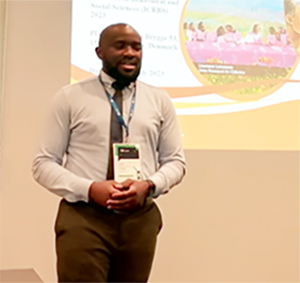College of Human Sciences
Exciting new way to combat fake news grabs experts' attention
At the recent 11th International Conference on Research in Behavioural and Social Sciences (ICRBS 2023), held in Copenhagen, Denmark, a lecturer from the Department of Communication Sciences, College of Human Sciences, Ndivhuwo Sundani, presented a thought-provoking paper on the pressing issue of fake news and misinformation in South Africa. The study, which focused on using digital media literacy as a mechanism to counter this problem, has drawn significant attention from academics and policymakers worldwide.

Ndivhuwo Sundani presenting his paper at the 11th International Conference on Research in Behavioural and Social Sciences held in Copenhagen, Denmark
His research revealed the alarming trend of increasing fake news spread through digital platforms in the country, fuelled by slow media literacy development and socio-economic challenges. Sundani's study offers key recommendations for media practitioners, digital media companies and educational institutions to prevent the dissemination of misinformation and empower information consumers.
The research unveiled the disturbing reality of fake news and misinformation's growing prevalence on digital media platforms within South Africa. This alarming trend is further compounded by the slow development of media literacy, hindered by limited infrastructure, lack of local content and low-income levels in the country.
"One of the core findings of my research highlighted the significant role of individuals working within the media and information space in promoting media and information literacy among the populace," says Sundani. "There is a dire need for collaboration between digital media experts, ICT developers and citizens to train South Africans in effectively navigating digital platforms, thereby curbing the spread of misinformation."
The previous National Research Foundation (NRF) scholarship holder emphasises the responsibility of digital media companies in fostering media and information literacy among their users. As key facilitators of information distribution, these companies can play a pivotal role in countering the spread of fake news and misinformation.
Moreover, the study underscored the importance of media literacy among digital media practitioners themselves. By equipping professionals in the field with media literacy skills, they can become effective agents in countering misinformation and fake news.
Adds Sundani: "One of the most significant recommendations derived from my research is the integration of digital media literacy into the educational curriculum. By introducing media literacy at the grassroots level, learners can become familiar with best practices for using digital media platforms responsibly."
Implementing these recommendations can empower information consumers to make informed decisions about the content they encounter on digital media platforms, ultimately curbing the rapid dissemination of misinformation and fake news.
His dedication to studying and addressing important societal issues is evident in his research interests, which include social media and youth, new media and education, health and political communication. Through his work and contributions, he actively advances knowledge in the field of communication science and helps society tackle the challenges posed by the digital age.
The importance of presenting at the 11th ICRBS goes beyond just the research findings. As Sundani's research continues to contribute valuable insights into digital media literacy and its implications for combating misinformation, it is hoped that policymakers and stakeholders will take proactive steps to foster media literacy and curb the spread of fake news in South Africa.
#Unisa150
* By Nokuthula Grace Langa (Department of Communication Science) and Tebogo Mahlaela (Communication and Marketing Specialist), College of Human Sciences
Publish date: 2023/08/09

 Unisa co-hosts G20 community outreach in the Eastern Cape
Unisa co-hosts G20 community outreach in the Eastern Cape
 Unisans gain membership of prestigious science academies
Unisans gain membership of prestigious science academies
 Advocating for disability transformation through servant leadership
Advocating for disability transformation through servant leadership
 Unisa Press continues to illuminate the publishing space
Unisa Press continues to illuminate the publishing space